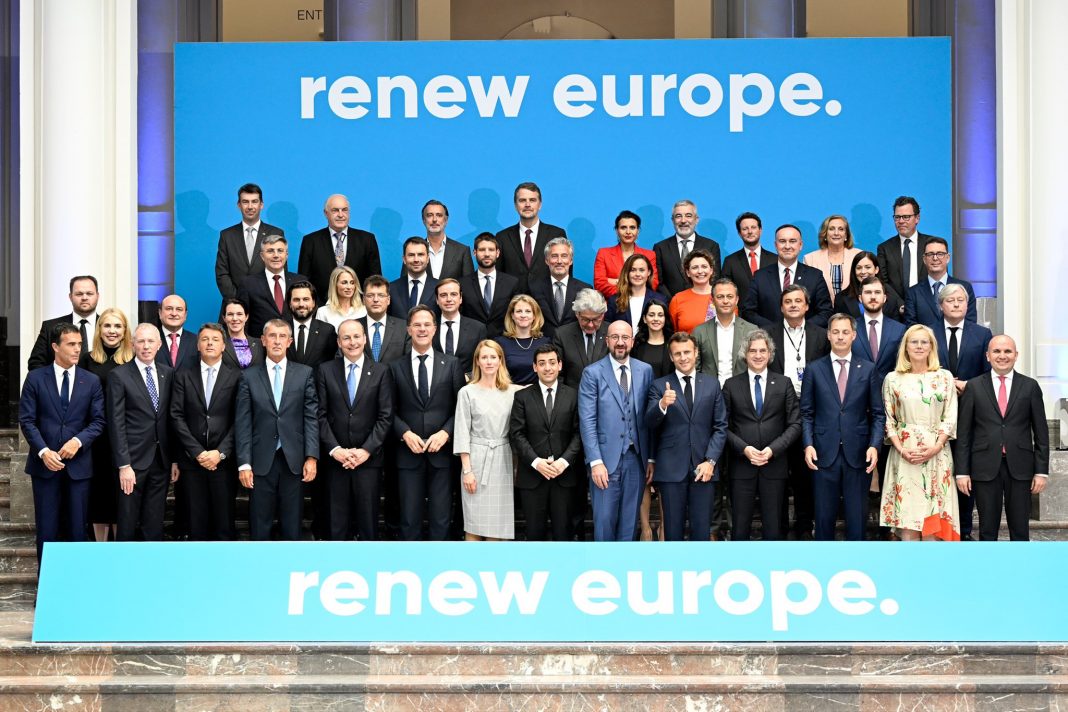One of the intrigues of the upcoming elections to the European Parliament in 2024, in addition to the predicted success of the extreme right-wing parties, is the predicted fiasco of the Greens and Liberals. We will discuss the chances of the Greens later, but for now we will focus our attention on the liberal political group Renew, which is in the EP in a “grand coalition” with the European People’s Party (EPP) and the Progressive Alliance of Socialists and Democrats (S&D).
It is worth noting that the upcoming elections to the European Parliament will not be an easy walk for the Liberals. According to most analysts, the group “Renewing Europe” will suffer significant electoral losses. Most likely, it will lose about 20 seats in the European Parliament and will probably get 81 seats in the European Parliament (today the Renew Europe group has 101 seats). Renew’s success in the 2019 European Parliament elections will therefore remain only a pleasant memory for the Liberals. And the reason for this decline lies primarily in the changing political climate in the EU countries, which reduces the popularity, including the liberal trend.
In this article Ascolta continues to study the electoral mood in Europe in the run-up to the elections to the European Parliament. Against the background of a steady strengthening of the positions of far-right political forces, the piece analyzes the prospects of maintaining the influence of liberal parties, which are represented in the European Parliament by the group “Renewing Europe” (“Renew”).
This Content Is Only For Subscribers
Today, most EU voters are moving away from an ideological approach to elections. The main factor is not ideology, but attitudes towards the five major European challenges of recent years – the deteriorating economy, the consequences of the pandemic, the war in Ukraine, climate change and the migration crisis. And it seems, judging by opinion polls on the eve of the European Parliament elections, that the answers offered by the Liberals to the key challenges of the time are not quite satisfactory to voters. However, five years ago, the picture of the world looked quite different for European liberals.
New trends
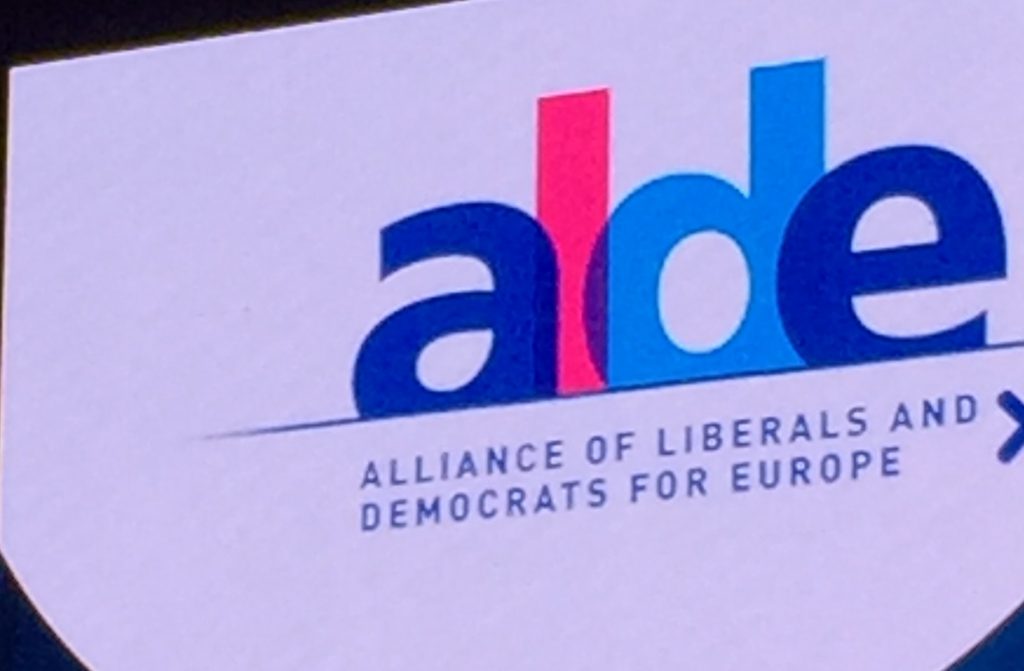
The 2019 European Parliament elections proved unusual in many ways. For several decades, interest in European elections has been waning. In the eyes of a significant part of the electorate, they remained unimportant. In the 2019 elections, however, this trend was reversed. The voter turnout was the highest in the last 20 years. Which, according to experts, was evidence of the increasing role of the European Parliament and the return of the pan-European agenda to the focus of attention of the majority of voters in EU member states. The results of the elections were such that allowed the majority of participants to interpret them in a favorable light. No one won definitively. No one lost catastrophically. Additional coalition alternatives, previously unseen in the EP, simply emerged, while predictions of an imminent significant breakthrough of Euroskeptic, pro-Russian, anti-liberal forces did not come true.
However, one change was visible to the naked eye: the de facto “two-party system plus” has disappeared. The fact is that for many decades the European political system was built on the competition between two political forces – center-right (Christian Democrats in Germany, conservatives in Great Britain, followers of Charles de Gaulle in France) and center-left (Social Democrats in Germany, Socialists in France, Labor in Great Britain). At the same time, for many years they have actually formed a coalition in the European Parliament, together advocating further integration within the European Union. According to the results of the elections to the European Parliament in 2019, the “losses” of these forces were the most sensitive: the European People’s Party lost 42 seats, and the Progressive Alliance of Socialists and Democrats lost 41 seats.
For the first time in the history of the European Parliament, they won less than half of the mandates – 329 out of 751 (after Brexit, the number of MEPs fell to 705).
At the same time, the “third forces” that became the main beneficiaries of the elections – the Liberals and the Greens – entered the political scene. Being “Euro-optimists”, but trying to distance themselves from the traditional ruling groups, they received the biggest increase in votes. “Alliance of Liberals and Democrats for Europe” (ALDE) (40 more mandates than in 2014) and “Greens” (plus 20 seats). As a result, the two main forces in the European Parliament had to seek help from ALDE to form a “three-person” coalition.
The European Parliament’s political group, the Alliance of Liberals and Democrats for Europe, was born in 2004 and became an alliance of European liberal parties, many of which were, and in some cases still are, in power in many European Union countries and EU structures. These include former Belgian Prime Minister and current President of the European Council Charles Michel, Dutch Prime Minister Mark Rutte, former Czech Prime Minister Andrej Babiš, former Danish Prime Minister Lars Rasmussen and many others. In May 2019, speaking at a debate, the president of the ALDE group in the European Parliament, Guy Verhofstadt, announced that after the elections, the “Alliance of Liberals and Democrats for Europe” group would be dissolved and a new alliance would be formed with Emmanuel Macron’s party “Forward, Republic!”.
Changes in the preferences of French voters
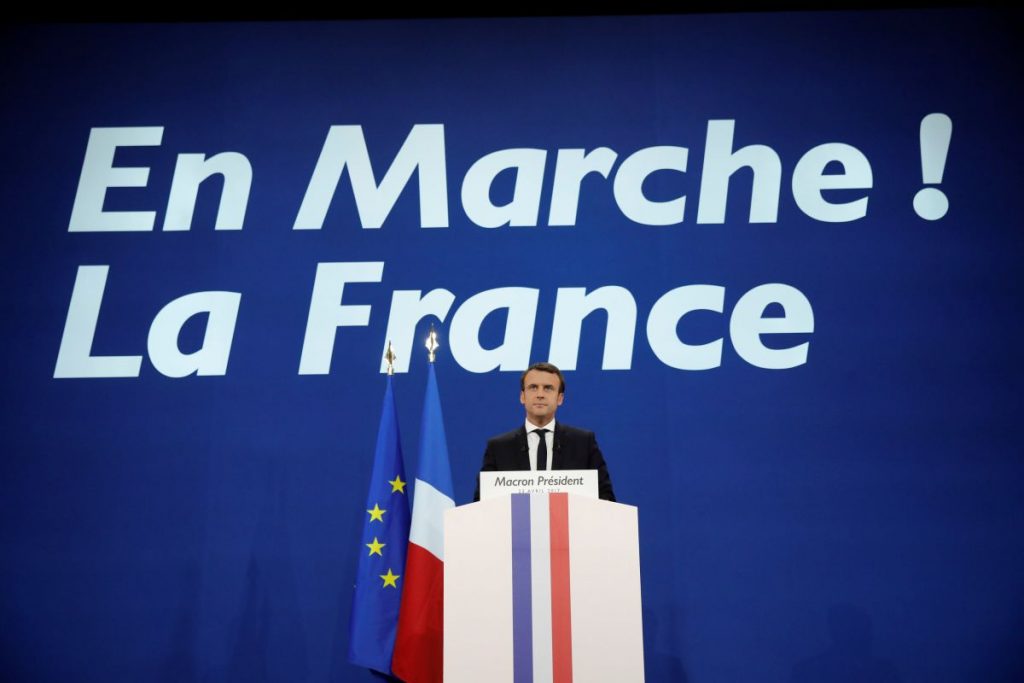
The elections to the European Parliament in France brought a number of surprises. The main one is the unexpectedly high turnout: 10% more than last time. The second was the fact that the Greens came third. And the last one was the unexpected failure of the Republicans, although it was expected that the third place would go to them.
Still, the main intrigue of the 2019 European Parliament elections in France was the confrontation between the pro-Macron bloc of parties, which included “Forward, Republic!” (LaREM), the “Democratic Movement” (MoDem), the “Radical Movement” (MR), the party “Act!” (Agir) and the opposition far-right National Rally party led by Marine Le Pen. Although Macron’s coalition was led by career diplomat Nathalie Loiseau, the heart and soul of the campaign was French President Emmanuel Macron himself, who corrected all of Loiseau’s “faults” along the way.
It is worth noting that the campaign for him took place in difficult conditions. Since the fall of 2018, France has been engulfed by “yellow vests” protests, first against Macron’s intentions to increase the tax on diesel fuel, and then presenting him with a whole range of social and economic demands. Over time, the category of people participating in the rallies changed, and the social characteristic of the actions themselves changed: violence, pogroms and many other things appeared, to which the authorities reacted harshly, with excessive use of force. This was also an unprecedented event for France. Historically, the country is accustomed to all kinds of demonstrations, and it can be noted that there was no such thing even in 1968: during the demonstrations of “yellow vests” dozens of people were maimed as a result of the use of traumatic weapons. And yet – this was a protest against Macron, on whom high hopes had previously been pinned.
Some French people accused him of acting as the president of the rich rather than the leader of all French people. A number of Emmanuel Macron’s statements, especially abroad, were very painfully received at home. The diesel price hike was just a pretext for this powder keg to explode. Therefore, the main condition for survival, the main insurance of his presidency, was that his main opponent was Marine Le Pen, and he himself, as well as his party, were positioned as the last non-alternative bulwark in the fight against fascism. In fact, this maneuver largely repeated the tactics of the presidential election campaign of 2017, when Emmanuel Macron, although he did not bleed the extreme right, but was definitely able to attract a part of the electorate of the center-right and left. In addition, the “yellow vests” movement made Macron a symbol of order. Therefore, a part of the right-wing electorate voted for his coalition: the conservative-minded French who supported “Republican” Francois Fillon in the first round of the 2017 presidential election.
And yet, we must give Macron credit. He had a brilliant pre-election marathon: on various occasions he traveled to the regions for hours-long speeches to mayors, actively communicated with the regional press, constantly gathered businessmen, politicians, trade union leaders in the Elysee Palace. In comparison with him, Nicolas Sarkozy did not participate in a single rally on the eve of the 2009 European Parliament elections. Emmanuel Macron’s activism could not but bear fruit. In the context of the protests taking place in France, the second place of the pro-Macron bloc led by the “Forward, Republic!” party, which received 22.41% of voters’ support and 21 Euro-mandates, did not look like a defeat.
Firstly, the gap with Marine Le Pen’s National Rally party was less than 1%. Second, in the course of the election, Macron successfully solved a number of tactical, and strategic tasks, keeping in mind, above all, the future presidential elections in 2022. If after the presidential elections of 2017 he “killed” the Socialists, the results of the elections to the European Parliament in 2019, Macron’s new “victim” was the “Republicans”. The president and his party have cleared the political field of competitors. Neither the Republicans, nor the Socialists, nor Melanchon’s extreme leftists were able to organize support from their electorate.
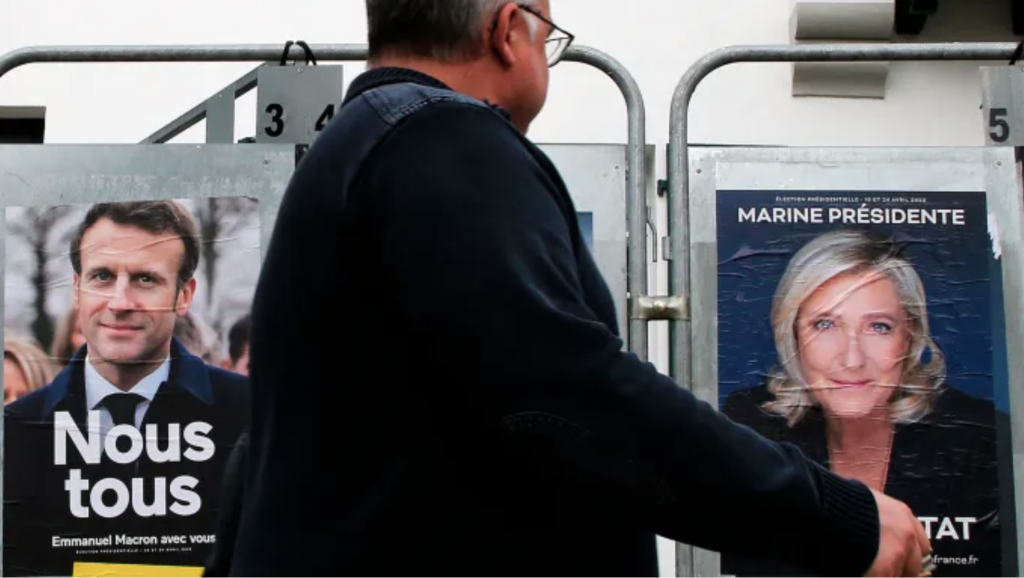
This strategy earned him a second presidential term in 2022, and in 2019 allowed him to win electorally “fat” Paris. “Forward, Republic!” won 32.7% of the vote in the capital, gathering almost as much support as Macron in Paris in the first round of the presidential election in 2017. In the capital, the presidential bloc took votes away, primarily from the “Republicans.” This opposition center-right party won 9.9% of the vote on the banks of the Seine – more than the country as a whole, but significantly less than it received in Paris in 2014 (22.6%). In addition, the Rassemblement Nationale was the least successful in Paris. Le Pen’s party, the leader in the all-French vote, managed to win only 7.2% of the vote in the capital – noticeably less than in 2014, when it was supported by 9.3% of Parisians.
For Marine Le Pen, the first place in the European Parliament elections was a kind of consolation prize after her defeat in the last presidential elections. The attempt of the extreme right leader to present the results of the vote as a kind of referendum of confidence in President Macron in the context of the “yellow vests” crisis and to force him, if not to resign (the current constitution does not provide for such a procedure), then at least to announce early parliamentary elections, was unsuccessful. The party needed a “reset” in order not to remain a “symbol without dynamics”. And it must be said that Le Pen, although not immediately, but in time managed to accomplish this task.
Summing up the results of the elections, it should be noted that the “yellow vest movement” led to the “repoliticization” of the part of the population that usually boycotted the elections. Youth marches in defense of nature and climate also influenced the results. By dramatizing the stakes in these elections, Macron was able to mobilize voters who supported his rise to power in 2017. As a result, participation in the European elections (50.1%) was the highest in a quarter of a century, and the French vote in the European Parliament elections showed that the “old” French parties are in deep crisis. With the exception of the Rassemblement Nationale, none of them could really compete with the presidential party “Forward, Republic!”
None of the other parties in the political group of the European Parliament “Alliance of Liberals and Democrats for Europe” was able to repeat the record of “Forward, Republic!” of 23 MEPs. However, the success of the liberals in other European countries cannot be ignored.
“Citizens”: the ups and downs
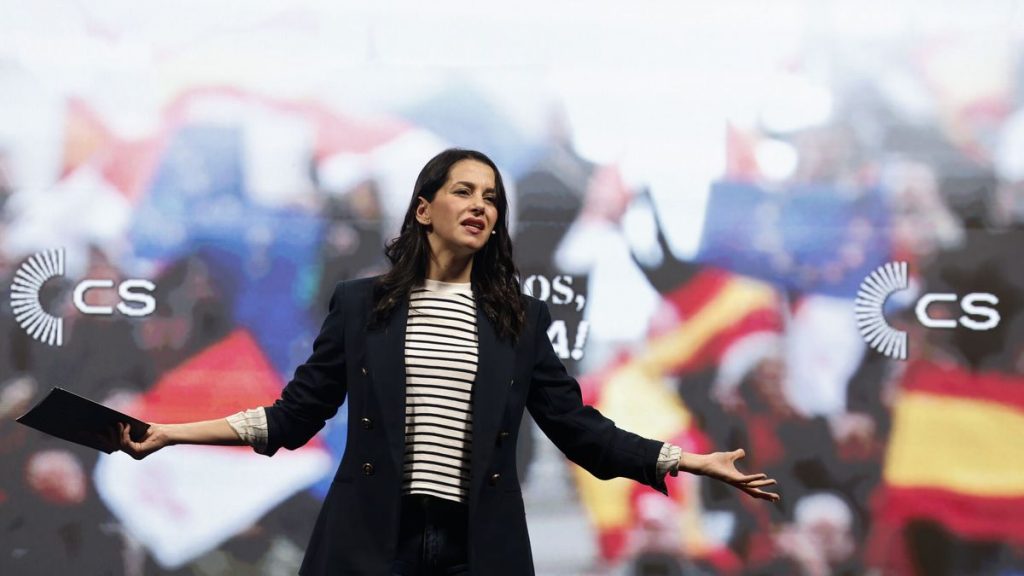
The year 2019 was a year of ups and downs for the Spanish liberal party Ciudadanos (Citizens), which was led by lawyer Albert Rivera for 13 years. Founded in 2006 in Catalonia, the party was a symbol of the struggle against Catalan nationalism and the independence movement. The party’s slogan was “Catalonia is my homeland, Spain is my country and Europe is our future.” Earlier, the party presented itself as a center-left force, but after 2017 it excluded any mention of social democracy from its foundations and tried on conservative-liberal clothes.
On the eve of the European Parliament elections in April 2019, Spain held early parliamentary elections in which the party, thanks to the criticism of the Spanish Socialist Workers’ Party achieved a resounding success with 15.86% of the popular vote, winning 57 parliamentary mandates and becoming the third political force in Spain. Representatives of the business community, international institutions, and the political elite hoped for a possible PSOE-Citizens coalition. Such an alliance would allow the country to get out of the economic risk, to immediately begin long overdue reforms and, at the same time, to carry out a number of socially significant laws. However, even before the start of the campaign, Albert Rivera categorically rejected this possibility, and the announcement of the election results was greeted by IMRP supporters chanting “Not with Rivera!”.
Consequently, the only viable option was a coalition of left-wing parties, between which there had been a gulf of misunderstanding and mistrust since the 2015 elections. If the parliamentary elections elevated Citizens to the political Olympus, the 2019 European Parliament elections have shown that resting on one’s laurels in politics is fraught. And any mistake in positioning can lead to electoral losses. As a result, despite the fact that “Citizens” retained the third position in the “standings”, they were short of 2 million votes, gaining 12.18% and winning 7 MEP seats. The attempt to drift to the right has not yet become a fatal mistake for the Citizens, but it has not gained the votes of the right, but lost its own. The votes of the Ciudadanos voters flowed to the relatively new extreme right-wing party Vox, for which more than 1.5 million voters cast their ballots and which won three mandates in the future composition of the European Parliament.
Successful “Action by disgruntled citizens”
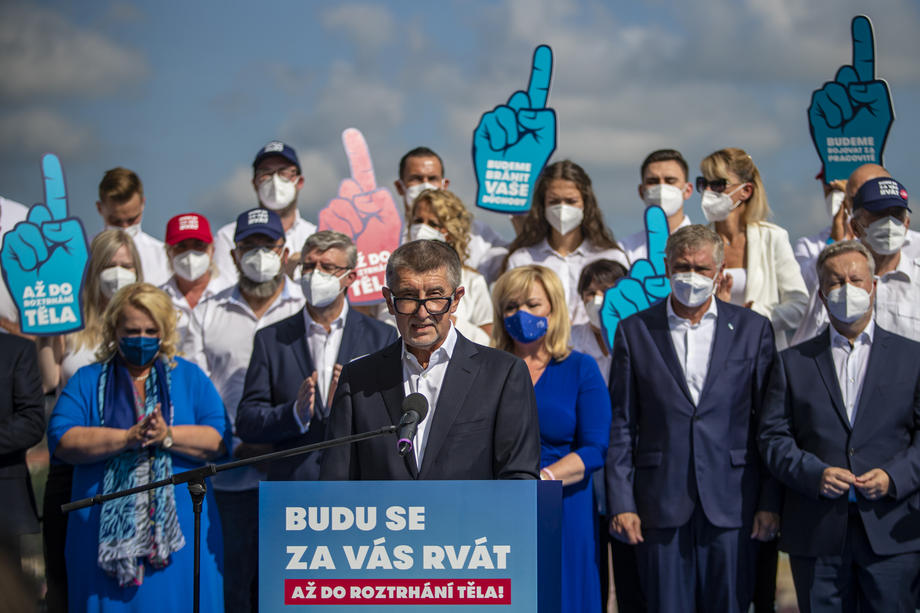
The ANO-2011 (Action of Disgruntled Citizens) movement, founded in 2011 by billionaire Andrej Babiš, made its contribution to the overall liberal group in the Czech Republic during the European Parliament elections. In general, this political force did not adhere to any specific ideology, but declared a liberal agenda: lowering taxes for entrepreneurs, fighting corruption, depoliticizing the prosecutor’s office and the police. In the 2017 parliamentary elections, ANO-2011 had its first major success. The movement gained 29.64% of the vote and won 78 seats out of 200 in the Czech parliament, and its leader Andrej Babiš headed a coalition government with the Social Democrats and Communists.
ANO 2011 went to the European Parliament elections as the ruling party. The main result of the elections was the convincing victory of ANO, which received 21.18% (6 seats in the EP). The closest pursuer – “Civic Democratic Party” lagged behind by 6.64%. The convincing results of ANO-2011 were demonstrated against the background of a barrage of criticism against Prime Minister and leader of the movement Andrej Babiš, who was accused by both the internal opposition and Brussels of misuse of European funds. However, this did not prevent his movement from improving its performance compared to the last election by 5 points (16.13% in 2014), demonstrating the broad support of the population for his program.
First of all, it stated the need for “substantial reform of the EU”, which should lead to the transformation of this association into a “strong union of strong states”. For this purpose, the role of the Union institutions should be clearly defined, and the interaction between the European Commission and the European Council should be adjusted. And the Czech Republic should have fought harder for direct influence on EU governance. An important place in the program was given to security issues, where the emphasis was placed on the autonomy of decision-making in determining the groups and individuals who should be given the opportunity to work and live in the Czech Republic. Considerable attention was paid to the struggle for equal competition of Czech entrepreneurs on the pan-European market without excessive bureaucracy; inadmissibility of double standards in food supply of Central European countries. The issue of transition to the euro zone was identified as a non-priority in the ANO program (at the same time, the Czech Republic wanted to participate in the discussion of its reforms).
Against the background of the ANO’s strengthening position, its coalition partners showed the opposite trend – a loss of electoral support. Thus, the Czech Social Democratic Party (ČSSD) showed an 8-point drop in confidence (from 14.17% to 3.95%), which prevented it from winning a single deputy to the EP; the Communist Party of Bohemia and Moravia also showed a similar trend (from 10.98% to 6.94%), but it managed to “stay afloat”. The explanation for this trend is that in recent years, ANO-2011 has made a significant shift to the left, which has led to a shift of voters close to these views to its side and the de facto elimination of its government allies. Having eliminated its partners, the ANO-2011 movement found itself in a situation where the strengthening of the opposition parties, which commanded a combined 47.4% of the vote and which were not in the mood for dialog with it, marked an inevitable transformation of the Czech political landscape.
Rutte’s victory loss

In the Netherlands, two liberal parties, the People’s Party for Freedom and Democracy (VVD) and Democrats 66 (D66), contested the 2019 European Parliament elections. Over the past 5 years, the liberals have experienced many internal political problems and tense national elections in 2017, where they won the first place with 21.3% and 33 seats in the House of Representatives of the General States. In turn, the leader of the People’s Party for Freedom and Democracy, Mark Rutte, retained the prime minister’s chair and formed a coalition government.
In the elections to the European Parliament, the liberals, although they lost the first place to the “Labor Party” (PvdA), headed by Vice-President of the European Commission Frans Timmermans, but managed to maintain a strong position in the EP. “Democrats 66” took 2 seats, and the ruling “People’s Party for Freedom and Democracy” of Prime Minister Mark Rutte has 5 mandates. It should be said that despite the shaky coalition in the parliament and constant attacks of right-wing populists, a big role in strengthening the position of Prime Minister Rutte and his party VVD was played by the support of Germany and anti-crisis communications of the party of the Prime Minister, who successfully fought off the scandals of the last 2 years, associated with dubious supplies of weapons to extremists in Syria and the abolition of 15% tax on dividends to please large corporations.
However, the Rutte government did make one mistake: they tried unsuccessfully to push through parliament a bill to expand the powers of the intelligence services to spy on the country’s citizens. At the referendum in March 2018, which was scheduled under pressure from the Socialists and others who disagreed with the law, the public rejected the bill, which was a personal defeat for the prime minister. However, this incident did not seriously affect the results of the EP elections.
However, in 2023, after the failure of negotiations on migration policy, Rutte was forced to announce the dissolution of the government and hold early parliamentary elections, which, in fact, became a knockout blow for his party. As a result of the elections, the far-right Freedom Party of Geert Wilders emerged as the absolute leader. Wilders himself became widely known for his harsh criticism of migration policy, statements about the need for the Netherlands to make a decision on leaving the EU, as well as actions to burn the Koran and ban mosques (because of which he had 24-hour security guards assigned to him).
Of course, Wilders himself still has to find common ground with other coalition forces and form his own government (in the Netherlands, such processes take quite a long time), but the serious reformatting of electoral sentiments and the unambiguous decline in the popularity of liberal forces will have their impact on the elections to the European Parliament.
The FDP is a “small weight” in big politics
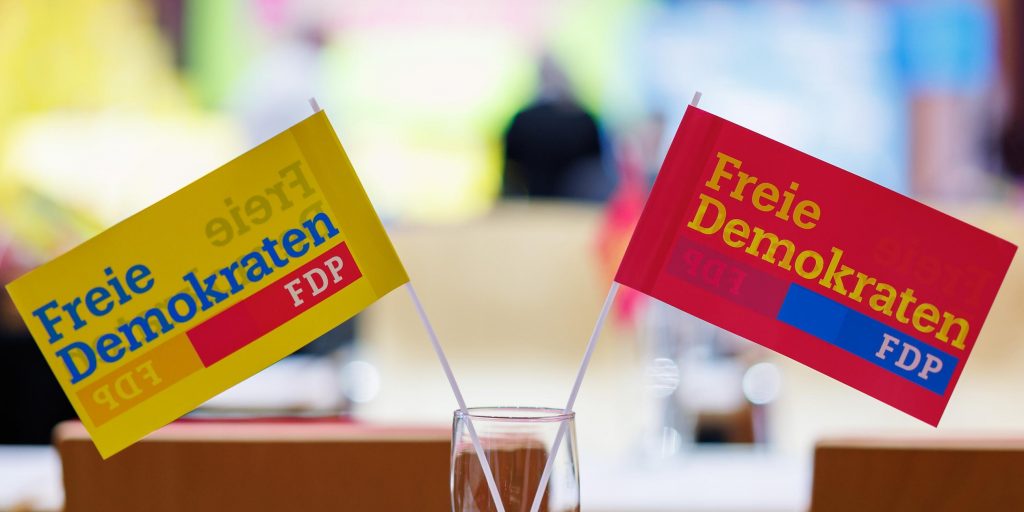
In Germany, the liberal flank is represented by the “Free Democratic Party” (FDP), which was established back in December 1948 and has become one of the largest parties in West Germany. Its agenda, a “classic” of liberalism: reducing the tax burden, reducing the influence of the state on economic policy, encouraging large and small businesses. The party’s economic slogan: “As much state as necessary, but as little as possible”.
The German political system is organized in such a way that it traditionally had two main parties, the center-left SPD and the conservative CDU/CSU. The electoral system required the parties running in elections to win more than half of the popular vote – only then could a government be formed. Since the mid-1960s, neither the SPD nor the CDU/CSU have been able to win the 50% of the German vote required to form a government. In this situation, the role of the FDP sharply increased, and with 5-7% of the vote, it received a “golden share” to form a government. The FDP was then nicknamed “the kingmaker” and “the little weights”.
In fact, nothing has changed to this day. Even today, the “traffic light coalition” in Germany did not do without the services of the FDP, whose leader, Christian Lindner, was given the portfolio of finance minister. Recently, however, the Greens have been competing with the liberals in “making kings”. The electoral problems of the “Free Democrats” began in 2013, when the party, having gained 4.8%, failed to get into the Bundestag for the first time. The failure did not come as a surprise, as it was preceded by failures in regional elections.
In the 2014 European Parliament elections, the party won 3 seats out of 96 allocated to Germany with 3.40% of the vote. This was due to the fact that in Germany, the formal threshold for passing the European Parliament elections was abolished and the party had to get at least 0.5% of the votes to participate in the distribution of mandates. Despite attempts by the Brussels bureaucracy to introduce a mandatory 2-5% pass barrier, the 2019 European Parliament elections were held under the old system. Compared to the last European Parliament elections, the FDP received 5.4% of the popular vote and 5 mandates in the EP. By the way, the political group “Alliance of Democrats and Liberals for Europe” was joined by another German liberal party of Germany “Free Voters” (FV), which gained 2.2% and received 2 more mandates.
Big and small piggy banks for ALDE
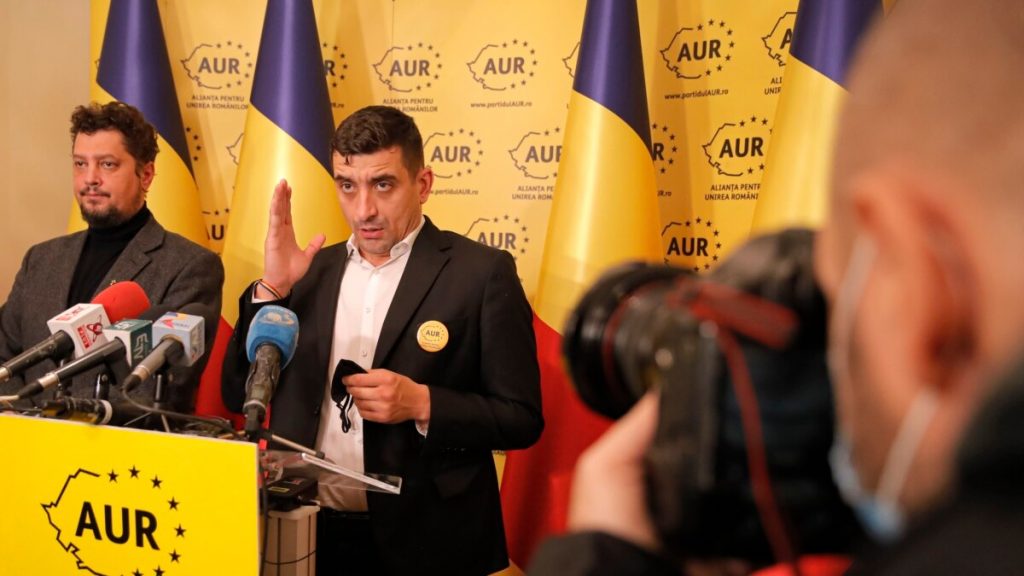
The political group in the EP “Alliance of Democrats and Liberals for Europe” had a good result in Romania, where the liberals were represented by the political bloc of parties “For Romania’s Future”, consisting of the “Union for the Salvation of Romania” and the “Party of Freedom, Unity and Solidarity”. The 2019 elections took place at the time of Romania’s presidency of the Council of the European Union. And it could have been a great occasion for a serious pre-election debate on a number of issues that require both medium and long-term responses from the EU. These include Brexit and migration, as well as the environment, employment, security and defense. However, the parties’ pre-election slogans suggested that there would be no such debate and that the parties would compete in populism and focus on criticizing each other.
“For the Future of Romania”, which included Romanian liberals, made the main “trick” of the campaign the theme of cleansing the government of thieves and corrupt officials, and built their strategy on criticism of the government. As a result, the bloc of Romanian liberals “For the Future of Romania”, which included the parties “Union for the Salvation of Romania” and “Freedom, Unity and Solidarity Party”, gained 21.39% of the votes and added six seats to the ALDE group.
Elections to the European Parliament are of less importance for the Nordic countries. One thing is due to the paltry number of seats allocated to them in the EP, which does not allow them to have a noticeable influence on the work of the European Parliament, which is dominated by the heavyweights – Germany, France, Italy, Spain, Poland. For the 2019 Euro elections, 20 deputies were elected from Sweden, 14 each from Finland and Denmark (after Brexit, each of these countries gained one additional seat). In order to get into the European Parliament, parties in Finland and Denmark had to pass the 5% threshold, in Sweden – 4%.
A year before the elections to the European Parliament, Sweden held national elections to the Riksdag. The parties belonging to the Alliance of Liberals and Democrats for Europe were represented by the Center Party, one of the oldest parties founded in 1913 and representing rural Swedes, and the Liberals. The results obtained by the parties in the elections showed a trend of electoral growth. The Center Party gained 8.6%, which was 2% more than in the last election and increased its representation in the Riksdag by 9 mandates, gaining 31 seats. The Liberals’ success was more modest. They increased their rating by one tenth of a percent, gaining 5.5% and increased their representation in the local parliament by one mandate, bringing it to 20 deputies. The Center Party performed strongly in the European Parliament elections, gaining 10.8% and winning two Euromandates. The Liberals performed worse than in the Riksdag elections, miraculously passing the threshold with 4.1% and winning only one seat in the EP.
In Finland, the EP election campaign was influenced by the national parliamentary elections, which took place about a month and a half before the elections. Therefore, the European Parliament elections were unlikely to bring significant changes. Two liberal parties got into the European Parliament from Suomi country: “Finnish Center”, which worsened its results in comparison with the EP elections in 2014 by gaining 13.5% and winning two mandates. The result of the second liberal force, the Swedish People’s Party, was even more modest – 6.3% and one European mandate.
The 2019 European elections were much more intriguing in Denmark, where the liberal-conservative party “Venstre”, led by Lars Rasmussen, not only won convincingly with 25.5% of the vote and won 3 seats in the European Parliament, but also significantly changed the political landscape of the country, sending the right-wing radical Danish People’s Party, which had been at the helm for a long time, to the political sidelines. Another liberal party of Denmark – “Radical Venstre” – also passed to the European Parliament, gaining 10.1% of votes and winning 2 mandates. In general, 12 seats of the “Nordic” MPs became a worthy contribution to increasing the representation of the “Alliance of Liberals and Democrats for Europe” in the European Parliament.
In Belgium, on the other hand, the liberal parties performed worse than in the previous European Parliament elections. The ALDE-affiliated Open Flemish Liberals and Democrats (OpenVLD), one of the traditional establishment parties, won 8.5% in the European elections with only two seats (one less than in 2014). Another liberal party, the Reform Movement (MR), then incumbent Prime Minister Charles Michel’s party, lost one parliamentary seat in the new EP as well, and won only one mandate. The voters’ decision was probably due to the dissatisfaction of a part of the French-speaking electorate with the government’s policy.
The success of liberal parties in the Baltic States should also be noted, especially in Estonia, where the “Reform Party” (RE) and the “Estonian Center Party” (C) gained 26.2% and 14.4% respectively, thus bringing 3 mandates to the total “piggy bank” of ALDE. In Lithuania, the Liberal Movement, with 6.1%, increased the liberal group of the EP by one more seat, as well as in Latvia, where the association of liberal parties Development/Za! (AR), with 12.4%, also gained one parliamentary mandate.
The 2019 European Parliament elections were a triumph for the political group Alliance of Liberals and Democrats for Europe (ALDE), if not a triumph, then definitely a move into the category of political heavyweights. The group not only became the third largest group in the European Parliament, gaining 40 seats compared to the last election, but also joined the “grand coalition”. Despite the fact that the Liberals won elections in the Czech Republic, Denmark, Estonia and Luxembourg, decisive for the increase of the group’s political weight was the decision to include 21 deputies from the French bloc of parties led by President Emmanuel Macron’s “Forward, Republic!”. It is quite indicative that the group even changed its name under the influence of the newcomer. The liberals in the EP began to sit under the sign “Renewing Europe” (Renew).
It should be noted that in this case, the “love” between Macron and European liberals was mutual. The group received all the “benefits” due to a member of the pro-government coalition (portfolios, funding, etc.), while Macron received the necessary leverage in European structures. It is not by chance that immediately after the elections Macron began to “torpedo” the candidacy of Manfred Weber from the European People’s Party for the post of the head of the European Commission. Behind such a demand of Macron, many experts guessed his claims for leadership in the EU and an attempt to “pull the blanket” over himself in the key Franco-German dispute. On the other hand, it is a “holy thing” to “tickle Merkel’s nerves” and cause a rift in the CDU/CSU coalition, closing the way to the highest European post to a member of the Bavarian CSU. And it must be said that Macron’s tactics worked. Weber was “removed from the race”, and in the process of informal contacts between the leaders of France and Germany, the candidacy of Ursula von der Leyen was agreed upon. At the same time, the liberals, united with the supporters of the French president, “forgot” to rally around their own alternative candidate for the post of head of the European Commission, which could have been Margrethe Vestager.
As a result of compromises and not without the influence of Emmanuel Macron in a single “package” with Ursula von der Leyen, the European Council unanimously named Belgian Prime Minister Charles Michel (from the Liberals) as its own chairman and proposed Frenchwoman Christine Lagarde, Managing Director of the IMF, as head of the ECB (also under Macron’s patronage), and Spaniard Josep Borrell from the Socialists as the EU’s High Representative for Foreign Affairs.
Macron’s influence was not limited to the EU structures. Emmanuel Macron took the reins of power in the liberal group of the EP, now with a new name “Renewing Europe. Apparently, so that Macron would not be suspected of “excessive” influence on European liberals, the group was initially headed by former Romanian Prime Minister Dacian Ciolos. However, two years later, the group’s leadership had an exclusively French “face”. Since 2021, its head has been Stéphane Séjourné, and after his appointment as French Foreign Minister, in January 2024, Valérie Aye. She is a member of the European Parliament from Emmanuel Macron’s Renaissance party and, at 37, became the youngest chair of the liberal faction in an EU legislature.
At the same time, there were persistent rumors that Dutch MEP Malik Azmany was a candidate for the post. But in the end he did not put forward his candidacy. His “People’s Party for Freedom and Democracy” is currently engaged in difficult coalition negotiations in the Netherlands after the victory of the far-right populist “Freedom Party” Geert Wilders in the November elections. Speaking at a briefing after her election as leader of the group, she said: “We have a close-knit family and we are optimistic about the upcoming elections.” However, not everyone shares this optimism….
Rise and fall
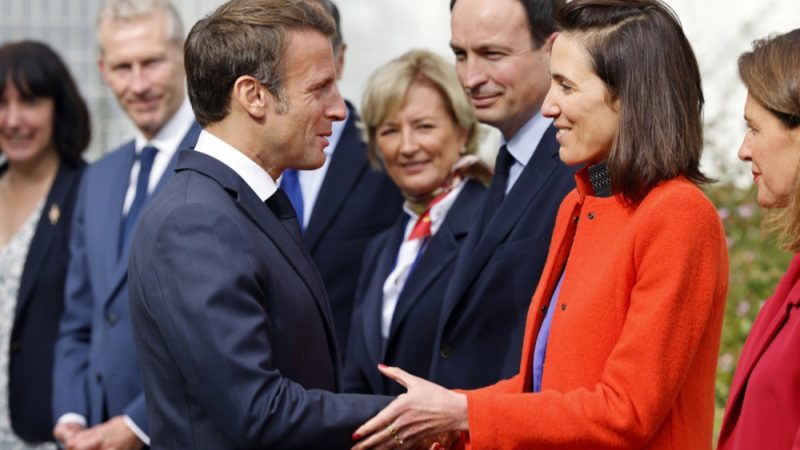
According to the latest sociological surveys, the group “Renewing Europe” will significantly lose political “weight” after the elections to the European Parliament. The results of the Politico poll show that compared to the current composition of 101 mandates, the group risks losing about 20 seats. There are several reasons why this will happen. First, the growing popularity of extreme right-wing parties will affect the representation in the EP of all parties of the “grand coalition”, including Renew. Secondly, the liberals are likely to lose seats in the countries with the largest European quota – Germany, France, Italy, and Spain. Thirdly, a number of parties that are now part of Renew may change their political orientation and join another group.
These are rather tactical reasons. But more fundamentally, there is a growing realization among EU citizens that liberal parties lack the ability to effectively address issues that significantly affect the daily lives of Europeans, such as migration and economic crises. And while the bulk of voters are struggling with the cost-of-living crisis, the EU’s green policies are also placing an increasing burden on the shoulders of Europeans. This is why conservatives, liberals, Social Democrats and Greens alike are now facing a crisis of genre.
However, let’s go back to the Renewing Europe group and look at electoral trends to see where the Liberals will gain and where they will lose.
Decadence for the Renaissance
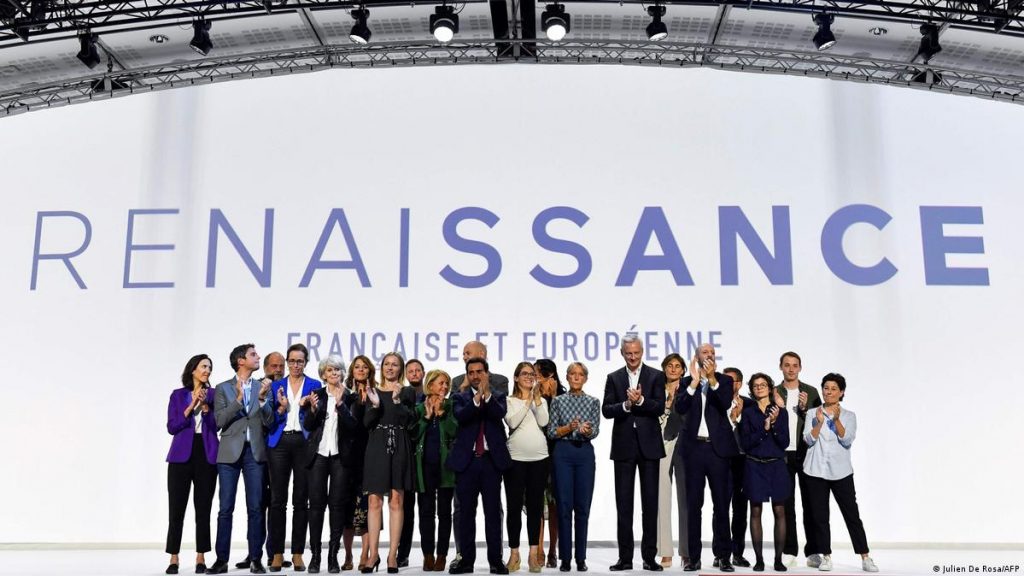
Today, only a lazy person is not discussing the critical gap in the upcoming elections to the European Parliament between Emmanuel Macron’s Renaissance bloc and Marine Le Pen’s Rassemblement Nationale (RN), which is being led by Jordaan Bardelle. According to various sociological forecasts, the gap between the pro-presidential Renaissance and its far-right opponents ranges from 14 to 16%.
For example, Politico gives Bardelle’s RN – 31% in its polls, while the Renaissance, which is being led to the polls by Valérie Aye, head of the Renew group in the European Parliament – 16%. The results of a poll commissioned by Le Figaro newspaper, LCI TV and Sud Radio by opinion research team IFOP-Fiducial show Bardelle with 31.5% and Aye with 17%. And a number of other polls also record a similar gap between Renaissance and Rassemblement Nationale.
It is no secret that the electoral strategy of the extreme right today is to turn the election into a protest vote against the government and President Emmanuel Macron, which, against the backdrop of the catastrophic fall in the French president’s rating, looks quite technological. Especially since, according to an Ipsos poll conducted by Le Monde, Cevipof, the Jean Jaurès Foundation and the Montaigne Institute, 52% of French people said they would “vote primarily to express their support or opposition to the President of the Republic or his government.” To add to this, another 53% of French respondents said they would take into account “above all the parties’ proposals on national issues” and 47% on European issues when choosing their candidate.
Emmanuel Macron’s problems in France did not start yesterday. The first alarm bell sounded for him at the parliamentary elections in 2022. Then Macron gathered a powerful political “fist” for the elections. His coalition called “Ensemble!” (Together), formed around the presidential party, which before the election was renamed from “Forward, Republic!” to “Renaissance,” also included François Bayrou’s MoDem (Mouvement démocrate) party. This centrist, Christian Democratic party had been part of the pro-presidential majority in the previous parliament. Another ally was a new party called Horizons, created by Edouard Philippe, a former right-wing politician and prime minister during the first three years of Macron’s presidency. Also in the bloc was a small party called Agir (Act!) led by Franck Riester, who has been part of Macron’s government for the past five years. This association of the “constructive right” was created in 2017. Although the presidential bloc “Together” won the elections, bringing 245 deputies to the National Assembly, it lost the most important thing – an absolute majority, where in the previous five years President Macron had the support of almost 350 deputies. By the end of 2023, Macron’s disapproval rating had fallen to 68, with 30% approval of his performance.
Realizing that European Parliament elections are ahead and the need to save his party’s rating, Macron announced changes in the government, after which, in January 2024, the head of government, Elisabeth Born, resigned. The 34-year-old Minister of Education Gabriel Attal, who today stands with Valérie Aye at rallies and actively participates in the election campaign, mobilizing his voters and convincing the wavering ones, becomes prime minister. He is actually doing what Emmanuel Macron did in the 2019 European Parliament elections.
The French president himself is campaigning through global politics, while at the same time solving the problems of his assertion as the leader of Europe. His magical transformation from a dove into a hawk and playing the “Ukrainian card” are part of this series. Macron expects that the activation in matters of assistance to Ukraine and statements about sending a military contingent will create conditions for “work” on Le Pen, portraying her as a “puppet” of Putin. And in the eternal dispute over who is in charge in the European house, one can criticize the “indecisive” Olaf Scholz, who is in no hurry to make cardinal decisions, for example, on the supply of Taurus missiles to Ukraine. Against his background Macron is simply the top of “decisiveness and dynamism”. However, one cannot fail to note the great contrast between his ambitious plans to “save Ukraine” and their modest results.
According to expert estimates, German aid to Ukraine is almost eight times higher than French aid. Moreover, Germany provides most of its finances to our country in the form of grants, while France provides loans, which Ukraine will have to repay later. Macron considers his proactive approach to the Ukrainian issue, among other things, as a convincing argument in favor of implementing his long-standing idea, drawn from Charles de Gaulle, of Europe’s strategic autonomy, especially against the backdrop of growing neo-isolationist sentiments in the United States.
Macron’s pursuit of the crown of European emperor has not gone unnoticed in the UK. The Guardian in its recent article literally “stomped” Macron, noting that against the backdrop of his calls to arm the EU or die, he himself is on the verge of “political death”. The publication convincingly argues that Macron’s unpopularity in France is the main reason for his party’s falling ratings: “…the 46-year-old president is largely to blame for his own political situation. He has so personalized his governing style that voters blame him for everything from the cost of living to rising youth violence and the risk of terrorism during this summer’s Paris Olympics,” the publication notes.
In unison with the British, dissatisfied voices are also echoing in the European Parliament: “Macron thinks it doesn’t matter that no one has heard of his main candidate, because he is convinced that he can attract pro-European votes for his name,” said a member of the Renew group. However, as experts note, it is unlikely that his name will stop the catastrophic drop in the presidential party’s rating; it appears to be only exacerbating it. According to sociological forecasts, the deficit of mandates will amount to 7 of the 21 that made it to the European Parliament in 2019. Which means a high probability that things will end in decadence for Macron’s Renaissance party.
The “civic” crisis of the Spanish liberals
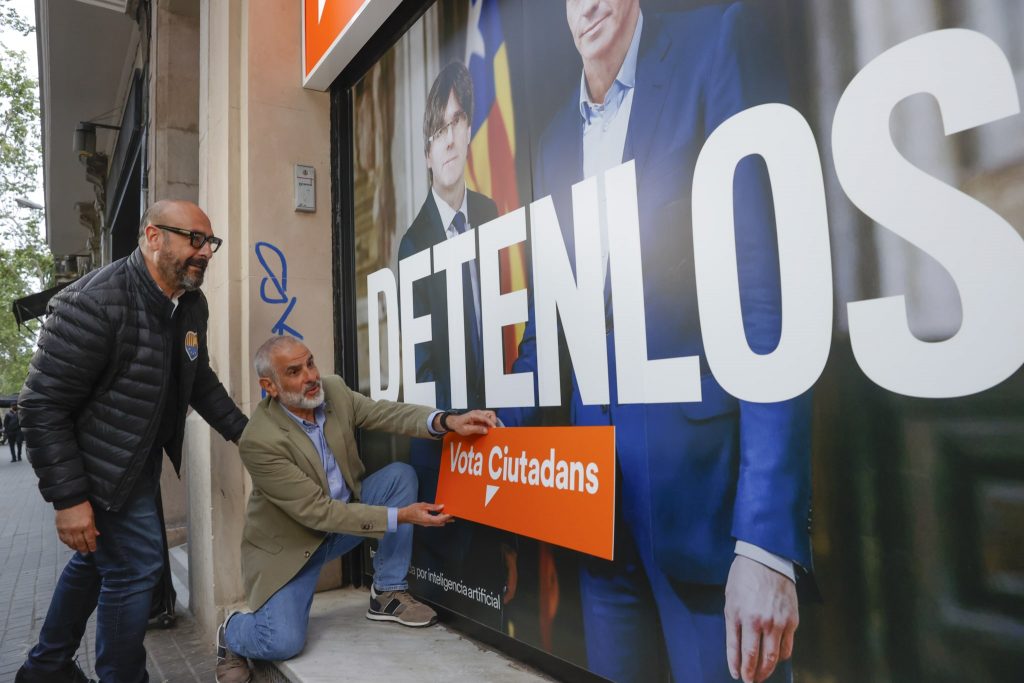
Another blow to the Renewing Europe group awaits in Spain, where the liberal Citizens party (Ciudadanos) seems to have completely disappeared from the political scene. Having today in the European Parliament, according to the results of the elections of 2019 – 7 seats, it risks to remain without representation in the EP. Civic’s problems began in the same 2019 November elections for the national parliament, where only 10 of the 57 seats won in the April elections remained. In that election campaign, Ciudadanos did not have a clear position on a number of important policy issues. Jumping from a right-wing agenda to a left-wing one led to its collapse.
Previously, voters voted for the Ciudadanos party with the hope that it would make an agreement with the Spanish Socialist Workers’ Party (PSOE). However, members of the Ciudadanos party kept saying that they would only make an agreement with parties with which they had a better deal. As a result, the party was left with a “broken trough”, losing its rating and a significant part of the electorate, which went to the center-right Popular Party and the far-right Vox party. The permanent leader of “Ciudadanos” Antonio Rivera resigned, and his place was taken by Jose Manuel Villegas. However, the change of leader did not affect the situation in the party and in the parliamentary elections of 2023 “Ciudadanos” remained outside the walls of the legislative body of Spain. In the upcoming elections to the European Parliament team “Citizens” is led by a new leader – Jordi Canas, who is in the party since its foundation. However, as opinion polls show, and with a new leader, the chances of “Ciudadanos” to get into the EP is equal to zero.
From other countries with the largest quotas in the European Parliament, including Germany (96 seats) and Italy (76), the liberals do not expect major electoral breakthroughs, which could bring additional bonuses in the form of parliamentary mandates to the “team score”. In Germany, their representation is “thinner” by two mandates. There, the “Renewing Europe” group includes two parties – the FDP, which has 5 seats and the “Free Voters” (FV) – 2 seats. The latter have little chance of retaining their representation in the group. The Free Democrats, on the other hand, seem likely to show their stable 5% support from their “nuclear” electorate and keep their representation in the Renew group in the same volume.
As for Italy, the liberal trend is clearly out of fashion today. The main struggle is between right-wing populists Giorgi Meloni of the Brothers of Italy, social democrats from the Democratic Party, and populists from the Five Star Movement. And Italy’s liberal flank can today count on a modest two mandates in the European Parliament elections. The “Renewing Europe” group is represented in the EP by two parties: “Action” (“Azione”) – 2 mandates, “Living Italy” (“Italia viva”) – 1 mandate, as well as another independent deputy. A Politico poll conducted at the end of April showed a 4% rating for Azione and 3% for Italia viva. In Italy, the pass rate is 4%, which means that, more likely than not, Action (AZ) will retain its two seats in the Renew group, while their liberal colleagues from Italia viva are likely to bid farewell to the European Parliament.
In the Netherlands, it seems that we will also witness another fiasco of the liberal mainstream. The liberals from Renew also risk losing their support in the Tulip Country. Today, the Netherlands is represented in the group by the People’s Party for Freedom and Democracy with 5 mandates, the Democrats 66 party with 1 mandate and another independent MP.
The beginning of the liberal decline in the Netherlands began in the parliamentary elections of 2023, in which the “People’s Party for Freedom and Democracy” (VVD) of Prime Minister Mark Rutte, who had been in power for 13 years, took the final third place. With 15.24% of the vote, the VVD lost to Geert Wilders’ extreme right-wing Freedom Party (RVV), which won 23.5% of the vote, and to the Labor Party and Green-Left alliance led by Frans Timmermans. Rutte’s party managed to hold 24 MPs instead of 34 two years earlier. The formerly mainstream liberal-centrist Democrats-66 (D66) also failed: instead of 24 seats in the previous parliament, it won only 9 in the new one.
In the run-up to the elections to the European Parliament, the situation has not changed dramatically. Thus, according to Ipsos polls for Een Vandaag, the “People’s Party for Freedom and Democracy” has lost another 3% compared to the parliamentary elections of 2023, and today with 12.7% of voter support can count on 4 mandates. But their liberal colleagues from “Democrats 66” have slightly improved the situation and instead of one mandate can count on two mandates with their 7.6% of voter support.
In neighboring Belgium with the Netherlands, Renew Europe has two representatives each from the Open Flemish Liberals and Democrats (OpenVLD) party and the Reform Movement (MR). According to a Politico poll, OpenVLD is gaining 10% of the popular vote and is most likely to retain its two parliamentary seats in the liberal group. As for the Reform Movement, its electoral position looks more favorable. According to the same Politico poll, MR is winning in the Brussels region with 22% and is in second place in Wallonia with 21%. In Belgium as a whole, the Reform Movement is gaining 14%, giving it the opportunity to bring Renew three more mandates.
The dead-end “Third Way”
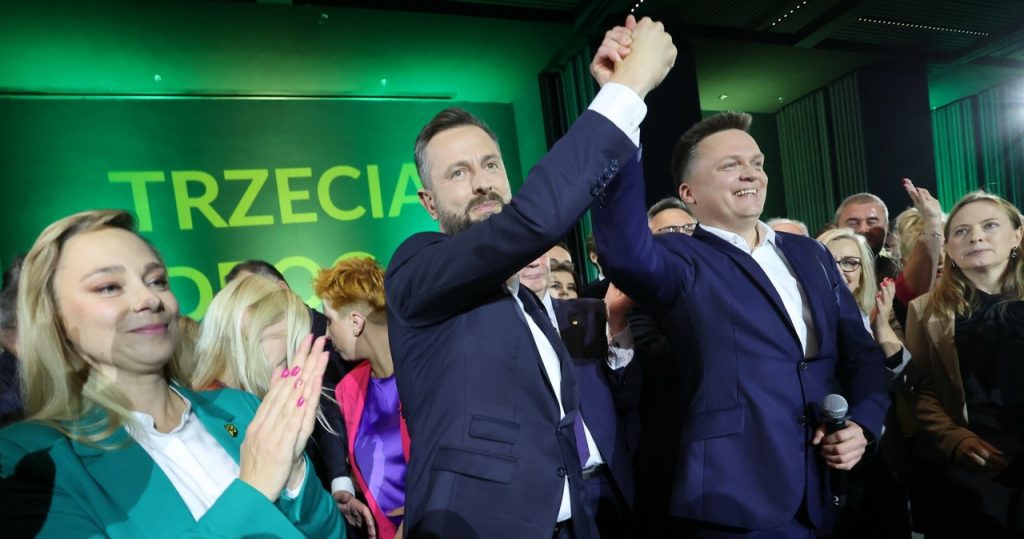
In Poland, despite a not insignificant quota of 53 members, the liberals in the European Parliament are very modestly represented. The “Renewing Europe” group includes one Polish representative from the “Poland 2050” party of Szymon Holowny, former editor of the Polish edition of Newsweek and current speaker of the parliament. Today, “Poland 2050” is part of the electoral bloc “Third Way” together with a number of parties united in the Polish Coalition led by Wladyslaw Kosiniak-Kamysz.
“The Third Way was established on the eve of the 2023 parliamentary elections as an alternative movement to Jarosław Kaczyński’s right-wing conservative Law and Justice (PiS) and Donald Tusk’s Civic Coalition (CC). In the Sejm elections, the Third Way won the support of more than three million voters, garnering 14.4% and winning 65 seats out of 460. In order to keep the PiS party, which won the election, out of power, the Third Way, together with Tusk’s Civic Coalition and Poland’s Lewica, formed a government majority, where Szymon Cholownia became Marshal of the Polish Sejm and Władysław Kosiniak-Kamysz received the portfolio of Poland’s Minister of Defense.
For the European Parliament elections, the Third Way is once again trying to position itself as a pro-European third force and an alternative to the parties of Kaczyński and Tusk. Against the background of the fact that the main struggle is unfolding between two antipodes in terms of worldview: the Eurosceptics from Law and Justice and the Civic Coalition, which unites pro-European forces, the Third Way is not the most advantageous position. In politics, unlike in life, when two people fight, the third can lose.
Donald Tusk’s party, positioning itself as the main fighter for European ideals against the allegedly “pro-Moscow” PiS and “biting off” more and more of the electoral pie, leaving other pro-European parties with crumbs. The attempt to compete in pro-Europeanism as a counterbalance to Euroscepticism with Tusk’s party has become a dead end for the Third Way. While Cholowny and Kosiniak-Kamysz’s bloc gained 14.25% in the local elections held in April this year, in just one month the Third Way’s rating collapsed. According to Polish publication Rzeczpospolita, citing the latest Opinia 24 poll, Third Way is supported by only 7.7% of voters. This is even less than their colleagues – the Left from the government coalition, which has 9%, as well as the right-wing Confederation with 8.8%, not to mention PiS with 30.6% and the Civic Coalition with 30.8%. Thus, the predictions of some liberal optimists that the Renew group will be enriched with 7-8 Polish MEPs are unlikely to come true. With the current electoral percentages, the Third Way can get a maximum of three mandates.
Another fiasco awaits the liberals in Romania. Today, the political group “Renewing Europe” has 7 Romanian representatives. It seems that unlike in the European elections 2019, the Romanian representation in Renew may be completely nullified.
In 2022, the main liberal party, the Union for the Salvation of Romania, experienced a leadership crisis. After the creation of a coalition between the Social Democratic and National Liberal parties, the Union for the Salvation of Romania was the main opposition force. However, the SSR’s lack of opposition led to the right-wing Alliance for the Unification of Romanians taking over the initiative. Within the party’s leadership, the party’s leader, former Romanian Prime Minister and former head of the Renewing Europe group, Dacian Ciolos, resigned. Cătălin Drulăle, vice-president of the Union for the Salvation of Romania, took over the party, and Ciolos created a new party, Renewing Romania’s European Project (REPER), which today represents the Romanian liberal flank.
Despite the fact that the party has an excellent reputation in the European Parliament, key posts and reports in the Brussels legislature, and its deputies Dragos Tudorache, Dragos Pyslaru and Dacian Ciolos are included in various influential European rankings, their achievements in Brussels mean nothing to Romanian voters. The REPER rating, according to various electoral polls in Romania, ranges from 1.8% to 3%, leaving the Romanian liberals little chance of overcoming the passage barrier.
On the other hand, Romania’s other representative in Renew, the Union for the Salvation of Romania, led by Cătălin Drulă, has gone “to the right”, joining the United Alliance of Right Parties, and today has 11% of voter support and a good chance of getting two MEPs. But they will have nothing to do with the “Renewing Europe” group.
Bulgaria in the liberal group “Renewing Europe” is represented by three deputies from the Turkish minority party “Movement for Rights and Freedoms”. The electoral dynamics for the DPS today are such that almost all sociological forecasts place it in third place among all participants in the upcoming elections to the European Parliament with 15% of voter support. So, with a high degree of probability we can say that it will retain its representation in the European Parliament in the same numbers.
From liberal, to right-wing populist
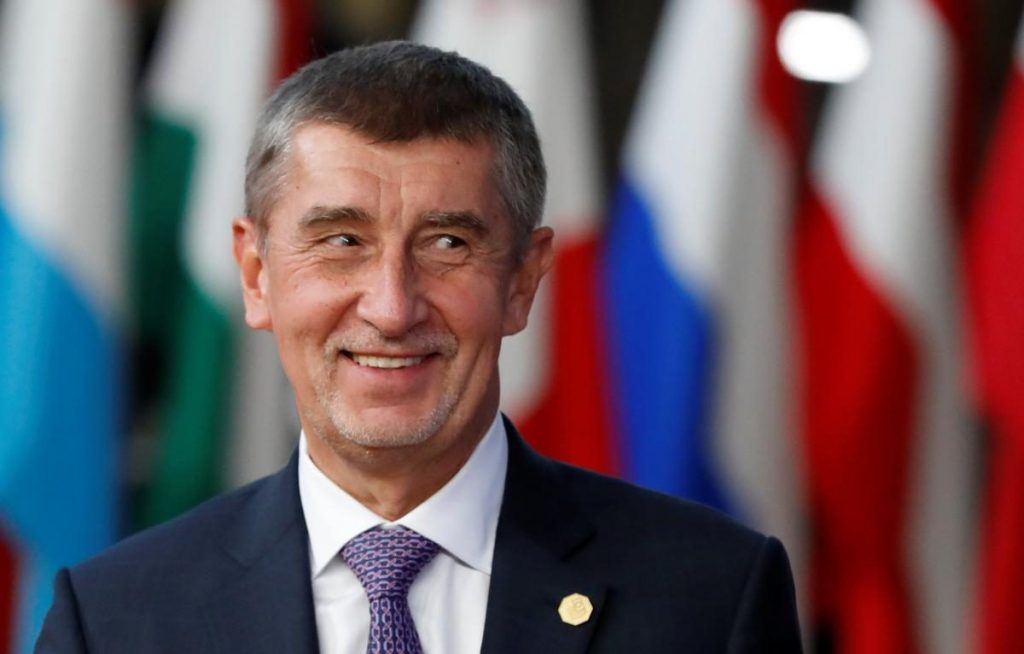
According to most European experts and analysts, the only country where representatives of the parliamentary group “Renewing Europe” will win the elections to the European Parliament in 2024 will be the Czech Republic, where the ANO-2011 movement, which is part of Renew, is confidently leading, with a level of support, according to various polls from 28 to 33% of the votes. However, in this case we will allow ourselves to disagree with European experts. No, not in terms of ANO-2011’s victory in the European elections in the Czech Republic. – Everything is very clear about that. But there are big doubts that the future 7-8 European mandates, which the movement will win, will fall into the piggy bank of European liberals.
Actually, ideologically, the ANO-2011 movement has never been liberal. In 2019, they acted more like liberal populists. At that time, their leader, Andrej Babiš, simply found it profitable to be in the “top European political league”. In reality, ANO-2011 is a typical populist project with a flexible and rather blurred ideology, which allows it to act rather situationally, oriented to the political situation and the demands of its target audience. In the five years that have passed since the European Parliament elections, a lot of water has flowed. “The ANO-2011 won the parliamentary elections in 2021, but failed to form a coalition, and Andrej Babiš resigned as prime minister. In 2023, Babiš again lost the presidential election to General Petr Pavel. Today, however, Babiš is determined to take revenge for past failures. Although his main goal is the parliamentary elections of 2025, the elections to the European Parliament could be an important milestone on the way to his cherished goal.
Today, the rhetoric of Babiš and ANO-2011 differs little from that of the right-wing populists who are gaining momentum. It is built on criticism of Brussels and the Czech government headed by Petr Fiala, which he personifies with the “hated” Brussels Eurobureaucracy. It is easy to be convinced of this by looking at his appeals to voters published on the website of the ANO-2011 movement:
“Will it be the EU under the dictate of unelected Brussels bureaucrats and technocrats who blackmail member states with money and European funds, or will the European Union be sovereign nation states that decide freely,” Andrej Babiš argues and adds, “…terms like freedom, independence, democracy, sovereignty, free market, prosperity, self-sufficiency, peace, security mean little to people in Brussels today.”
The government of Petr Fiala, which has taken a number of unpopular measures in order to reduce the national debt, has also suffered. These include an increase in utility rates, which was followed by thousands of protests in Prague, the suspension of pension indexation, cuts in public sector salaries, as well as an increase in property tax and the elimination of two dozen tax exemptions. And the “cherry” on the cake was the government’s decision to raise from 10% to 21% the VAT rate on beer, the favorite drink of most Czechs.
By the way, the reduction of this tax was one of the anti-crisis measures of the Babiš government. Therefore, it is not surprising that the lag of the nearest pursuers of ANO-2011 from the pro-government bloc “Together”, which includes the center-right forces: the Civic Democratic Party, the Top 9 party and the Czech Christian Democrats, is, according to various polls, from 10 to 15 percentage points. The electoral agenda of Babiš’s team exploits themes that run counter to the liberal views of Renewing Europe. It concerns migration policy – “…the government secretly developed and pushed through in Brussels the EU migration pact, which is an invitation for hundreds of thousands of migrants from Africa and the Middle East to Europe.” The same as the far right’s attitude to the Green Agenda – “…this government has endorsed a ban on internal combustion engines, agreed emissions quotas for households and passenger transport and other Green Deal nonsense that has jeopardized our industry and living standards”.
ANO-2011 did not ignore the topic of military aid to Ukraine. And although unlike Slovakia and Hungary, the movement does not use blatant anti-Ukrainian rhetoric, nevertheless, it criticizes the authorities for helping Ukraine instead of supporting ordinary citizens. Thus, it is more likely that following the results of the European elections, ANO-2011 will end up in a right-wing political group, such as the European Conservatives and Reformists, where additional votes will be badly needed for Giorgi Meloni, who is entering the fray for the post of head of the European Commission.
To summarize Renew Europe Groupe’s electoral prospects in the future European Parliament, it is safe to say that as the European electorate shifts to the right, the liberal group is losing more and more seats in different countries. According to opinion polls, it has already been displaced from the third position among all political groups in the European Parliament by the right-wing conservative group Identity and Democracy (ID) and is literally on the heels of the second right-wing conservative group European Conservatives and Reformists (ECR). In all likelihood, Renew will not be limited to the projected loss of 20 mandates.

